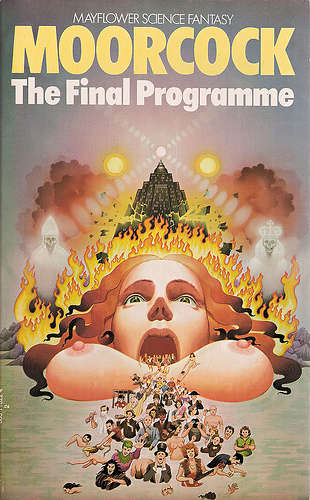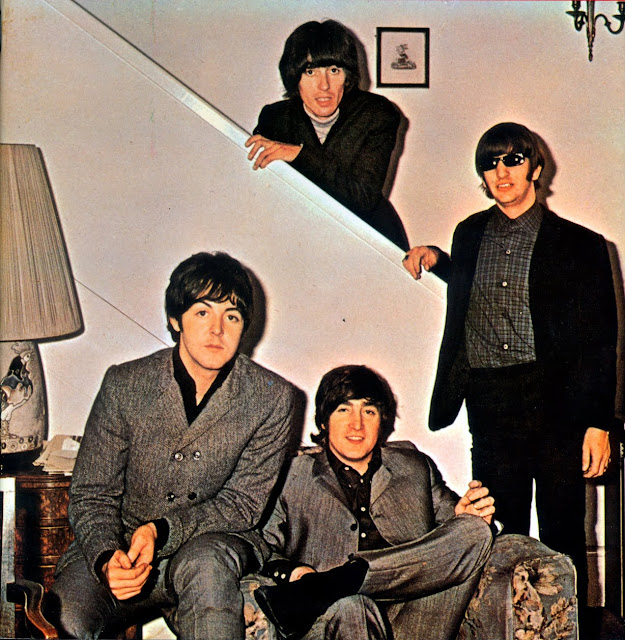Tuesday, August 21, 2018
Programmed For Confusion
The 1973 film 'The Final Programme', made in England just as that country's film industry was at an all-time nadir, is simultaneously provocative, audacious, and unique while also being frustrating, short sighted, and ultimately a disaster for nearly everyone involved. A rare attempt to film a relatively new speculative fiction cutting edge book, there is plenty of style of display, but ultimately it comes up short at a couple of important junctures. Unlike 'Zardoz', a similar and contemporary movie that takes huge artistic chances, in the end 'The Final Programme' is a failure and largely forgotten except by a very small group of cult film fans. What the hell happened?
The movie is based on a novel by Michael Moorcock, a prolific English author and editor, and was one of his earliest works. Moorcock came of age in the 1960s, and his work form that period reflects not only a rock 'n roll sensibility, but goes even further in both hippie culture and psychedelia. His greatest success came in the form of the Elric novels that he wrote, completely counter sword & sorcery to anything that Robert E. Howard ever had in mind. Elric is a sickly albino prince who relies on black magic and drugs to survive, bringing a Byronic element back into fantasy fiction. Moorcock was also the editor of 'New Worlds' magazine, a job he handled very well, creating a counter-culture forum for such writers ad J.G. Ballard and Brian Aldiss, among many others.
Just as Moorcock did not write standard sword & sorcery but instead turned the conventions of the genre on its head, he did the same with science fiction. Almost single handedly he ushered in the era of speculative fiction in Great Britain, opening up science fiction to more art-oriented, cutting edge writing and subject matter. His 1969 novel 'Behold the Man' ranks with the best and most controversial books published in the 1960s. He wrote essays critical of Tolkien and Heinlein, working frequently with rock groups such as Hawkwind and Blue Oyster Cult. The second major character that he created was Jerry Cornelius, a sort-of parody of James Bond, and the first Jerry Cornelius book was 'The Final Programme'.
The book first appeared as a series of short stories in 'New Worlds' magazine, then was re-polished into a short novel. It is a hip 1960s take on spy stuff, wildly popular at the time, as well as various science fiction elements thrown into the mix. There are also transparent and deliberate rewrites of plot points from the Elric series, such as the condition of Jerry's sister and relationship with his brother. Moorcock is perhaps the most self-referential writer that I have ever come across. He has written dozens of series and they all refer to each other; all seem to be part of a grand 'Eternal Champion' series. I must confess that I lost interest in all this sometime in the early 1980s, but there is a tremendous fan base out there who has not.
The British film industry was in a woeful state by 1970, heavily dependent on Hollywood for support funding. Part of the problem was the David Lean effect; film makers who wanted to spend years on projects, creating epic movies. When the studio system in America collapsed in the mid 1960s, the English talent either fled to Hollywood to feed like dinosaurs on a shrinking pool of capital in a financial desert, or they went into low budget stuff. Without the breakout success of the British music industry, spearheaded by the Beatles and then followed by innumerable groups, the situation would have been much worse.
Hammer horror did okay for awhile, but by 1970 even that studio was having trouble finding distribution. English censorship laws didn't help, and three British films in 1971 ran into trouble; 'A Clockwork Orange', 'Straw Dogs' , and 'The Devils', coincidentally three of the biggest hits. Even the mighty James Bond franchise, seemingly British to the core, was produced by Canadian Harry Saltzman and American Cubby Broccoli. One actor who they were very interested in filling the role of James Bond in 1973, after Sean Connery left the series was Jon Finch.
Finch, a fan of Moorcock's fiction, must have found the part of square James Bond, with his tuxedo and martini, entirely too boring and instead chose to star in 'The Final Programme' as Jerry Cornelius. He is rather good in the part, looking more like a rock star than a super spy, quite willing to indulge in all the sex and drugs that the script requires. He was an up-and-coming star, having just appeared in the lead for Alfred Hitchcock and Roman Polanski films. Had he chosen instead to be James Bond, blocking Roger Moore, that series might have taken a radically different turn. We will never know.
For a director, Robert Fuest was chosen, hot off the success of two Dr. Phibes movies starring Vincent Price. As Hammer movies were sinking into oblivion, Fuest had managed to find a way to make stylish but low budget horror films with a wonderfully campy and self-mocking tone. The Dr. Phibes movies are as funny as they are scary, and the set designs, emphasizing art deco, often steal the show. The combination of Finch and Fuest should have been a ticket to success.
Moorcock wasn't so sure from the beginning; he wanted his pals from Hawkwind to provide the soundtrack but Fuest used a breezy jazz theme, circus-like, instead. Hawkwind and Moorcock were confined to a non-musical cameo. Still, the plot follows the book in most ways and the tone is cheerfully post-apocalyptic, a cross between 'A Clockwork Orange' and Ken Russell's 'Tommy' from a few years later. Moorcock claims that he had to let the actors know that the movie was a comedy but I doubt that; anyone who had seen his previous two Dr. Phibes films would see that Fuest loved to push the absurd and humorous. Despite a very low budget and a plot that carries the deficiencies of Moorcock's novel (too little action on Jerry's part, unmotivated action), the first eighty minutes of the movie do work pretty well.
There is a ton of style on display; the casual sex and destructive attitude that characterized Britain in the early 1970s - the same attitude that gave rise to punk in 1976, revolting against everything including the commercialized revolt of the rock industry - is perfect. Unfortunately, the plot, which was fine as a series of connected short stories or in a short novel, has trouble getting condensed into a film. Random weird shit happens all the time and the viewer is expected to keep up, when the basic information needed to understand what is happening is not there. Still, I do find the movie an enjoyable and very rare look at a disturbing time in modern British history.
There are a lot of good things happening in the movie, most especially in the character of Miss Brunner, played by Jenny Runacre. I remember first seeing the movie on HBO in the very earliest days of cable television in the mid 1970s. The casual lesbianism was even more interesting than the casual nudity, and the way that Miss Brunner absorbed the bodies of her lovers of both sex was startling. Also, the fact that Jerry Cornelius was a terrible spy and always messing up everything he was trying to do, including accidentally killing his own sister, was very daring.
Two things absolutely killed the film dead when it came out; the ending as changed by the writers and/or director, and the studio had no clue what they were selling or who they were selling it to. The ending is awful, reducing the entire movie to a shaggy dog story, and it is rightfully remembered as one of the worse ways to end the plot. Needless to say, Moorcock hated it, and it is the polar opposite of the book. Even if they had been faithful to the ending, the studio and distributors were so confused by the tone of the movie, as can be seen by all the alternate titles ('Last Days of Man on Earth') and completely strange posters that this project would have been in trouble.
The above poster is by far the worse, making the movie seem like it belongs in the 'Planet of the Apes' series while giving the ending away. 'Zardoz' has a similar weird ending, but that one is in keeping with the general audacity of the entire project. 'The Final Programme' ends on a cheap Borsht Belt joke that kills the movie's atmosphere dead and renders any viewer horrified for the wrong reason. It also seems to have killed the career of anyone associated with the film, which was a huge flop. Jon Finch was never a leading man again. Robert Fuest never got to direct anything except the schlock horror 'Devil's Rain'. Nothing by Michael Moorcock has ever threatened to be filmed since this movie, now 45 years old.
It's a shame, really; there is a lot to like if you are interested in either speculative fiction or British culture of that period. However, like Punk which emerged like the creature created by the final programme of the title, it all seems so self-destructing, not made to last or be sequelized, unlike nearly everything Michael Moorcock has written. All we are left with is this strange artifact, something that almost could have been good but failed through a clash of a writer's vision and a film maker's sensibilities. If you ever see it, try to enjoy 'The Final Programme' for what it is, a noble failure.
Subscribe to:
Post Comments (Atom)














No comments:
Post a Comment